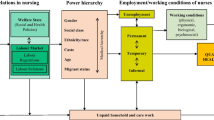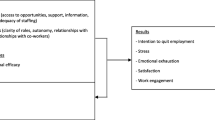Abstract
The aim of this article was to explore nursing home (NH) nurses’ perceptions of what influences their occupational status. A hermeneutic phenomenological approach was taken, during which 13 nurses from 7 NHs for older people located in England were each interviewed up to five times using an episodic interview technique. Findings suggested that economic policies regarding funding long-term care, and perceptions of the nature of work undertaken in NHs, may together negatively impact the occupational status of nurses working in these settings. This reduced occupational status is proposed as a factor which shapes nurses’ perception of this role. Low occupational status may also impact on these nurses’ ability to enact the role. Finally, the article documents how NH nurses may attempt to manage issues of status in order to retain occupational esteem.
Similar content being viewed by others

References
Abbey, J. et al (2006) Clinical placements in residential aged care facilities: The impact on nursing students’ perception of aged care and the effect on career plans. The Australian Journal of Advanced Nursing: A Quarterly Publication of the Royal Australian Nursing Federation 23(4): 14–19.
Aggleton, P. and Chalmers, H. (2000) Nursing Models and Nursing Practice, 2nd edn. Basingstoke, UK: Palgrave Macmillan.
Althusser, L. (1971) Ideology and ideological state apparatuses (notes towards an investigation). In: B. Brewster (ed.) Lenin and Philosophy and Other Essays. New York: Monthly Review Press, pp. 127–186.
Angelopoulou, P., Kangis, P. and Babis, G. (1998) Private and public medicine: A comparison of quality perceptions. International Journal of Health Care Quality Assurance 11(1): 14–20.
Arasli, H., Ekiz, E.H. and Katircioglu, S.T. (2008) Gearing service quality into public and private hospitals in small islands: Empirical evidence from Cyprus. International Journal of Health Care Quality Assurance 21(1): 8–23.
Ashforth, B.E. and Kreiner, G.E. (1999) ‘How can you do it?’ Dirty work and the challenge of constructing a positive identity. The Academy of Management Review 24(3): 413–434.
Ashforth, B.E. and Kreiner, G.E. (2002) Normalizing emotion in organizations: Making the extraordinary seem ordinary. Human Resource Management Review 12(2): 215–235.
Ashforth, B.E., Kreiner, G.E., Clark, M.A. and Fugate, M. (2007) Normalizing dirty work: Managerial tactics for countering occupational taint. Academy of Management Journal 50(1): 149–174.
Borsay, A. (2009) Nursing history: An irrelevance for nursing practice? Nursing History Review 17(1): 14–27.
Bourdieu, P. (1986) The forms of capital. In: J.C. Richardson (ed.) Handbook of Theory and Research for the Sociology of Education. New York: Greenwood Press.
Bourdieu, P. and Passeron, J. (1977) Reproduction in Education, Society and Culture. London: Sage.
Carehome.co.uk. (2015) Promoting good care. Carehome.co.uk, http://www.carehome.co.uk/care_map_search.cfm?category=1000, accessed 20 July 2015.
Carpenter, M. (1993) The subordination of nurses in health care: Towards a social divisions approach. In: E. Riska and K. Wegar (eds.) Gender, Work and Medicine: Women and the Medical Division of Labour. London: Sage, pp. 115–125.
Clements, L. (2010) NHS funding for continuing health care in England: The revised (2009) guidance. Social Care and Neurodisability 1(1): 39–47.
Colombo, F., Llena-Nozal, A., Mercier, J. and Tjadens, F. (2011) Help Wanted? Providing and Paying for LongTerm Care. Paris: OECD Health Policy Studies.
Comas-Herrera, A. et al (2006) Future long-term care expenditure in Germany, Spain, Italy and the United Kingdom. Ageing and Society 26(2): 285–302.
Davies, S. (2005) Meleis’s theory of nursing transitions and relatives' experiences of nursing home entry. Journal of Advanced Nursing 52(6): 658–671.
Department of Health. (2012) National Framework for NHS Continuing Healthcare and NHS-Funded Nursing Care (Revised). London: Department of Health.
Doling, J. and Ronald, R. (2012) Meeting the income needs of older people in East Asia: Using housing equity. Ageing and Society 32(3): 471–490.
Flick, U. (2000) Episodic interviewing. In: M. Bauer and G. Gaskell (eds.) Qualitative Researching with Text, Image and Sound: A Practical Handbook. London: Sage, pp. 75–92.
Flick, U. (2009) An Introduction to Qualitative Research, 4th edn. London: Sage.
Gadamer, H.G. (1976) Philosophical Hermeneutics. Berkeley, CA: University of California Press.
Gadamer, H.G. (1979) Truth and Method, 2nd edn. London: Sheed and Ward.
Goode, W. (1978) The Celebration of Heroes: Prestige as a Social Control System. Berkeley, CA: University of California Press.
Gregg, P. and Wadsworth, J. (2003) Labour market prospects for less skilled workers over the recovery. In: R. Dickens, P. Gregg and J. Wadsworth (eds.) The Labour Market Under New Labour: The State of Working Britain. Basingstoke, UK: Palgrave Macmillan.
Guy, M.E. and Newman, M.A. (2004) Women’s jobs, men’s jobs: Sex segregation and emotional labour. Public Administration Review 64(3): 289–298.
Harrison, P. (2010) The cultural authority of natural history in early modern Europe. In: D.R. Alexander and R.L. Numbers (eds.) Biology and Ideology: From Descartes to Dawkins. Chicago, IL: University of Chicago Press, pp. 11–35.
Henwood, M. (2010) Journeys Without Maps: The Decisions and Destinations of People Who Self Fund. Oxford: Putting People First Consortium.
Higgins, I., Slater, L. and Peek, C. (2007) The negative attitudes of nurses towards older patients in the acute hospital setting: A qualitative descriptive study. Contemporary Nurse: A Journal for the Australian Nursing Profession 26(2): 225–237.
Hippel, W.V., Hippel, C.V., Conway, L., Preacher, K.J., Radvansky, G.A. and Schooler, J.W. (2005) Coping with stereotype threat: Denial as an impression management strategy. Journal of Personality and Social Psychology 89(1): 22–35.
Hughes, E.C. (1951) Work and the self. In: J.H. Rohrer and M. Sherif (eds.) Social Psychology at the Crossroads. New York: Harper and Brothers, pp. 313–323.
Hughes, E.C. (1958) Men and their Work. Glencoe, IL: Free Press.
Huppatz, K. (2010) Respectability and the paid caring occupations: An empirical investigation of normality, morality, impression management, esteem in nursing and social work. Health Sociology Review 19(1): 73–85.
Jervis, L. (2001) The pollution of incontinence and the dirty work of caregiving in a US nursing home. Medical Anthropology Quarterly 15(1): 84–99.
Judge, T.A., Bono, J.E. and Locke, E.A. (2000) Personality and job satisfaction: The mediating role of job characteristics. Journal of Applied Psychology 85(2): 237–249.
Kaiser Family Foundation. (2001) National Survey on Nursing Homes. Menlo Park, CA: Kaiser Family Foundation.
Kreiner, G.E., Ashforth, B.E. and Sluss, D.M. (2006) Identity dynamics in occupational dirty work: Integrating social identity and system justification perspectives. Organization Science 17(5): 619–636.
McMurray, R. and Pullen, A. (2008) Boundary management, interplexity, and nostalgia: Managing marginal identities in public health working. International Journal of Public Administration 31(9): 1058–1078.
McMurray, R. (2012) Embracing dirt in nursing matters. In: R. Simpson, N. Slutskaya, P. Lewis and H. Hopfl (eds.) Dirty Work: Concepts and Identities. Basingstoke, UK: Palgrave Macmillan, pp. 126–142.
Neville, C., Dickie, R. and Goetz, S. (2014) What’s stopping a career in gerontological nursing? Literature review. Journal of Gerontological Nursing 40(1): 18–27.
Raikkonen, O., Perala, M. and Kahanpaa, A. (2007) Staffing adequacy, supervisory support and quality of care in long-term care settings: Staff perceptions. Journal of Advanced Nursing 60(6): 615–626.
Reed, J., Cook, G., Sullivan, A. and Burridge, C. (2003) Making a move: Care-home residents' experiences of relocation. Ageing and Society 23(2): 225–241.
Reed, J., Proctor, S. and Murray, S. (1996) A sampling strategy for qualitative research. Nurse Researcher 3(4): 52–68.
Sandelowski, M. (1995) Sample size in qualitative research. Research in Nursing and Health 18(2): 179–183.
Thompson, J. (2016) An exploration of the role and status of nurses working in nursing homes for older people: A hermeneutic phenomenological study. PhD thesis, Northumbria University, Newcastle-upon-Tyne.
Toles, M., Young, H.M. and Ouslander, J. (2012) Improving care transitions in nursing homes. Generations: Journal of the American Society of Aging 36(4): 78–85.
Twigg, J. (2000a) Carework as a form of bodywork. Ageing and Society 20(4): 389–411.
Twigg, J. (2000b) Bathing: The Body and Community Care. London: Routledge.
Twigg, J., Wolkowitz, C., Cohen, R. and Nettleton, S. (2011) Conceptualising body work in health and social care. Sociology of Health and Illness 32(2): 171–188.
Wade, S. and Skinner, A. (2001) Student placements in nursing homes. Nursing Older People 13(2): 14–17.
Wright, F. (2003) Discrimination against self-funding residents in long-term residential care in England. Ageing and Society 23(5): 603–624.
Zarei, A., Arab, M., Froushani, A.R., Rashidian, A. and Tabatabaei, S.M.G. (2012) Service quality of private hospitals: The Iranian patients’ perspective. BMC Health Services Research 12(1): 31–31.
Zhou, X. (2005) The institutional logic of occupational prestige ranking: Reconceptualization and reanalyses. American Journal of Sociology 111(1): 90–140.
Author information
Authors and Affiliations
Corresponding author
Rights and permissions
About this article
Cite this article
Thompson, J., Cook, G. & Duschinsky, R. Experiences and views of nursing home nurses in England regarding occupational role and status. Soc Theory Health 14, 372–392 (2016). https://doi.org/10.1057/sth.2016.3
Published:
Issue Date:
DOI: https://doi.org/10.1057/sth.2016.3



